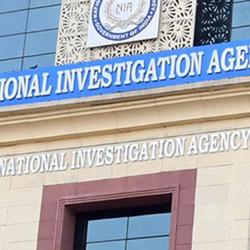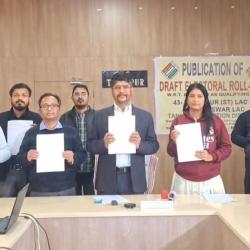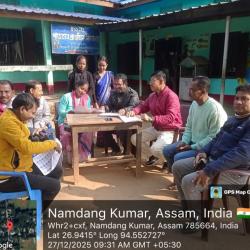The rivers of Northeast India are changing, and not for the better. Once lifelines of the region, they are now at risk due to glacial retreat, erratic rainfall and intensifying floods. On World Water Day 2025, the North-East India Water Talks, or NEIWT, sounded the alarm, submitting a memorandum to key policymakers, including the governor of Manipur, the chief minister of Tripura and water resources ministers from all Northeastern states. Their message was clear: Act now, or the region faces a dire water crisis.
Melting Glaciers a Looming Threat
This year’s theme, “Glacier Preservation,” reflects a sobering reality—Himalayan glaciers are disappearing. Scientists warn that by 2050, river discharge could fall by 15% to 20%, leading to severe water shortages, hydropower failures and biodiversity loss. Financially, the impact could be catastrophic, with hydropower shortfalls alone potentially costing the region more than $2 billion.
NEIWT convenor K.K. Chatradhara painted a grim picture: “The water crisis in Northeast India is no longer a distant threat—it is happening right now. Our rivers are drying, floods are more destructive than ever, and communities are struggling for reliable water access. We cannot afford to wait any longer.”
Five-Point Plan for Water Security
In its memorandum, NEIWT outlined a five-point action plan to tackle the crisis:
-
Regional cooperation with neighboring countries for transboundary water management.
-
Investment in climate-resilient infrastructure to combat erratic water flows.
-
Community-driven conservation efforts to restore and protect local water sources.
-
Cutting-edge research to find long-term solutions for water security.
-
Stronger governance policies aligned with national and global climate commitments.
The urgency of the situation was echoed by water activists across the region. The memorandum was signed by leading environmentalists from various states, including K.K. Chatradhara of Assam, Ram Wangkheirakpam of Manipur, Ranju Dodum of Arunachal Pradesh, Joannes JTL Lamare of Meghalaya, Zion Lalremruata of Mizoram, Thomas Malsom of Tripura, Tosangla C. Chang of Nagaland and Mayalmit Lepcha of Sikkim.
Raising Awareness Through Discussions and Exhibitions
NEIWT’s advocacy extended beyond policy discussions. The group hosted an online dialogue, “Water: Concerns, Challenges and Caveats from Northeast India,” featuring three young researchers: Donald Takhell of Manipur, Unmillan Kalita of Assam and Thomas Malsom of Tripura. The discussion highlighted the severe challenges posed by climate change and explored potential solutions for sustainable water management.
At Dibrugarh University, NEIWT also took part in Akayan, an exhibition organized by CSWS-DU. The event attracted students, experts and practitioners eager to engage in discussions on the future of water resources. Among the key participants were Manas J. Chutia, Baskar Borah, Jaya Chutia and Pranjal Saikia.
A Literary Tribute to Northeast India’s Water Heritage
The celebrations concluded with a symbolic act of knowledge sharing. Tez Kingkar Borah of NEIWT presented a gift to the District Library of North Lakhimpur, Assam—a newly published book, “Majuli’r Panir Katha.” This collection of 21 water stories from Majuli, published by Sugandhi Pakhila for NEADS with support from the HBS New Delhi Regional Office, offers a heartfelt exploration of the deep bond between the people of Majuli and their water resources.
The Call to Action
As rivers recede and floods become more violent, NEIWT’s message is a stark warning: Northeast India’s water future hangs in the balance. The organization urges policymakers to act decisively, ensuring that communities, ecosystems and economies remain resilient in the face of climate change.
For more information, visit www.newatertalk.in.
- 6332 reads










Add new comment